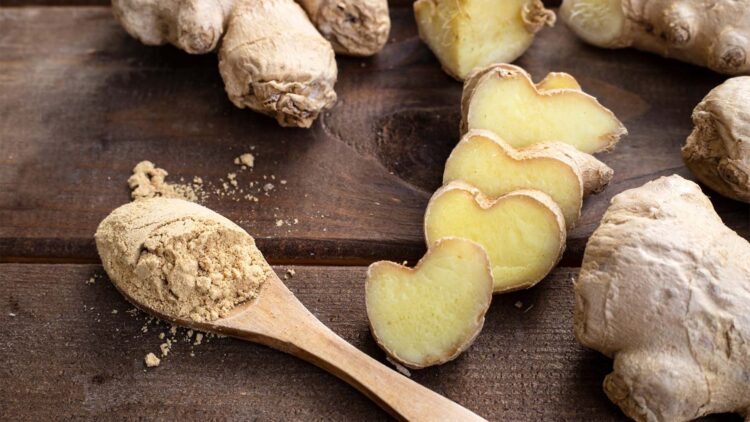Ginger (Zingiber officinale) has been used in Ayurvedic and Traditional Chinese medicine for thousands of years. And this has a realy good reason, of course. People rely to give energy boosts, to soothe the stomach, and help overcoming colds. Turns out that grandma was correct, and science is now showing that ginger has many (great) uses appart from just adding a nice flavor to your food.
It has natural compounds like Gingerol and Shogaol. And this compounds is what make the spicy a heroe. According to recent research, they can reduce blood pressure, balance HDL and LDL cholesterol, calm down nausea, and even help those who have Type 2 diabetes. Furthermore, ginger may also reduce inflammation in autoimmune diseases like rheumatoid arthritis, it can help ease osteoarthritis pain, and even shield the brain from Alzheimer’s. It might even be a good friends when there’s cancer cells, according to preliminary lab research.
Fixing nausea and calming inflamation
The NHS itself recommends ginger for nausea. That’s why pregnant women use it a lot for morning sickness. Scientists believe it works by calming signals in the stomach and brain while also easing gas and bloating, it’s like if these spice tells your stomach to chill. Some people say it helps during chemotherapy, which usually increases nausea. So if you haven’t yet, and one day your feeling deezy, go get that warm ginger tea, it will help.
For painful cramps (PMS), sore knees, or muscle pains after you worked too hard at the gym, yes, ginger also helps. But how? Because it has potent anti-inflammatory properties (the famous gingerol and shogaol). According to studies, you can say goodbye, or well calm a lot the period pain, the sore muscles and even stiffness in osteoarthritis.
The inside work and benefits of ginger
But this is not all. This spice has the power to prevent the immune system from overreacting in those with autoimmune conditions, it reduces he activity of neutrophils, which are white blood cells that often become overactive in diseases like lupus, rheumatoid arthritis and antiphospholipid syndrome.
According to a large review of research, ginger can increase HDL cholesterol while decreasing triglycerides, total cholesterol, and LDL cholesterol, which basically means that is lowering the “bad” cholesterol and increasing the “good” one. Additionally, it might lower blood pressure. What else do you need from ginger?
Well there’s still more, ginger is especially interesting for those who have Type 2 diabetes, because a few grams daily can improve insulin utilization and stabilize blood sugar levels. Which says that ginger can generally improve vitality and reduced cardiac strain.
According to lab research, it may protect some nerve cells from the kind of deterioration that Alzheimer can cause. And it may slow the growth of some cancer cells, according to other lab tests.
There’s still so many more studies to be done about the benefits and the efficiency of this spice, but from this preliminary results, they already suggest that ginger goes beyond just cooking.
How to use it safely
For most people, ginger is usually safe in food or tea. However, as anything in this life, excess in never good. So consuming more than 4 grams a day my not be good; It can cause stomach discomfort or heartburn. And also, increases the effectiveness of blood thinners (such as warfarin or aspirin) which means you might be getting more than what you need and this can interact with blood pressure or Type 2 diabetes medications.
You don’t have to make it the miracle medication, it will never be. Put it in your soup, add some to your smoothie, or your tea. Use it because it taste good, and then let it do it’s magic naturally.

